Literature Review: Scholarly Source #1
The article by Alldred, Kennedy, Hughes, Chen, and Miller (2016) provides a review of scholarly literature describing the results of interventions aimed at improving medication prescribing practices in nursing homes.
The authors state that there exists a considerable amount of evidence that prescribing practices in nursing homes remain suboptimal, and that these practices need to be improved in order to enhance patient outcomes and reduce costs required for care.
The authors included 12 studies in their review; these studies pertained to 10,953 residents in 355 nursing or care homes which were located in 10 different countries. Out of these 12 studies, the research design of 9 studies was cluster-randomized controlled trials, whereas the other 3 studies featured the patient-randomized controlled trial design.
The review conducted by Alldred et al. (2016) revealed that providing nursing homes with interventions aimed at improving medication prescribing practices may lead to the following outcomes:
- a reduction in the number of days that patients spend in hospitals;
- a slower reduction of the quality of life of the patients caused by their health;
- better identification of problems related to medication, and their further resolution;
- enhanced appropriateness of medication.
Nevertheless, it is unclear whether the interventions for enhancing medication prescribing practices were able to cause an improvement in the following factors:
- lowering the cost of drugs;
- adverse medication events;
- mortality.
On the whole, however, the study confirms that providing interventions for nursing homes with the purpose of bettering their medication prescription practices may allow for significantly enhancing certain patient outcomes and improving their overall quality of life, as well as for lowering the amount of time that such patients spend in hospitals.
These findings confirm that the current quality improvement project may help enhance the quality of life of patients of nursing homes.
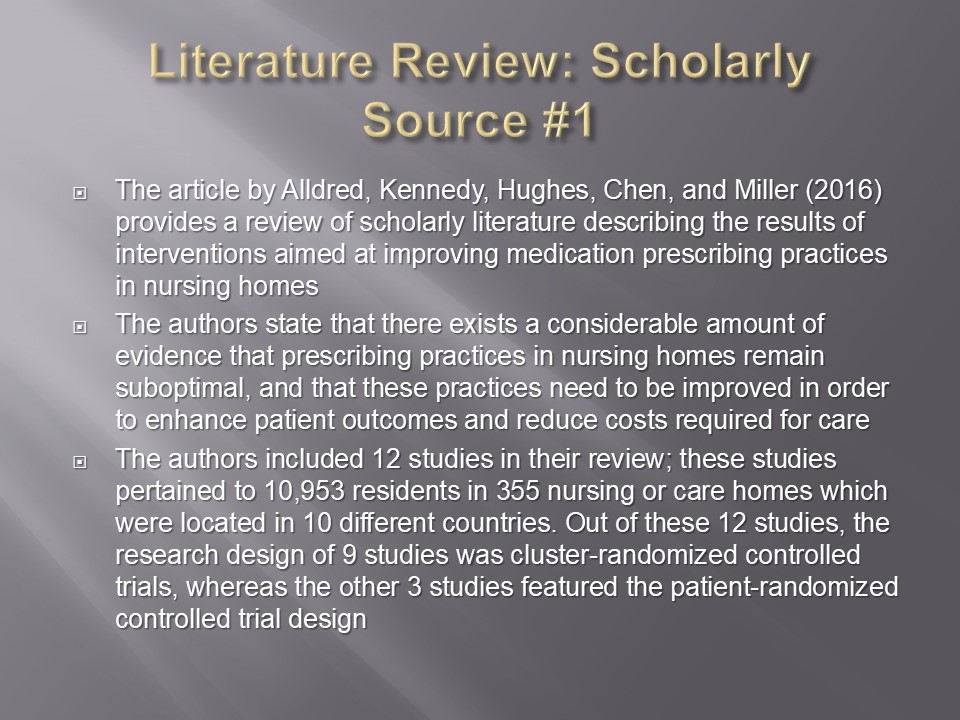
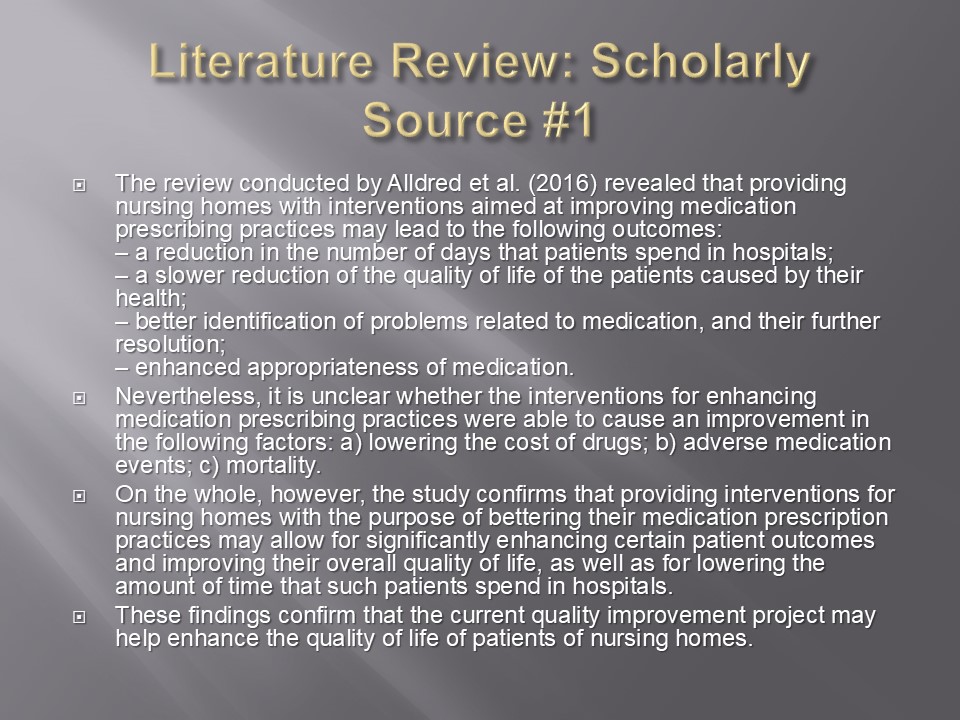
Literature Review: Scholarly Source #2
The article by Brulhart and Wermeille (2011) describes the results of a study aimed at researching the outcomes of implementation of a pharmaceutical care intervention in a number of nursing homes for elderly individuals.
The researchers implemented the interventions in 10 nursing homes in Switzerland during the period starting in January 2007 and ending in December 2009, and reviewed the drug therapy of 329 patients.
Prior to the interventions, each patient took the number of medicines ranging from 2 to 27, with the mean value of 12.8. The researchers were able to detect a total of 1,225 drug-related problems in the sample; these were discussed with the nurse and the physician serving these patients.
The interventions resulted in re-evaluation of treatment for the patients, and led to the total of 803 treatment adaptations (Brulhart & Wermeille, 2011):
- 373 cases: medications were cancelled;
- 197 cases: dosages were adjusted;
- 95 cases: the instructions for the drug use were revised;
- 86 cases: medication choices were changed;
- 35 cases: drug formulations were adjusted;
- 17 cases: new medications were started.
On the whole, the interventions permitted for considerably reducing the annual spending pertaining to medications in nursing homes. Also, the nurses and practitioners from the nursing homes were very satisfied with the outcomes of the interventions (Brulhart & Wermeille, 2011).
The authors stress that continuous drug reviews allow for enhancing medication therapy and lowering the excessive use of drugs, as well as for decreasing the costs spent on purchasing the medicines (Brulhart & Wermeille, 2011).
This piece of scholarly literature confirms the statement that drug therapy in nursing homes often remains suboptimal, and that interventions are needed in order to enhance medication therapy practices.
Brulhart and Wermeille (2011) also provide a model for carrying out pharmaceutical interventions in nursing homes, and mention a number of instruments which may be utilized in order to better assess the results of such interventions.
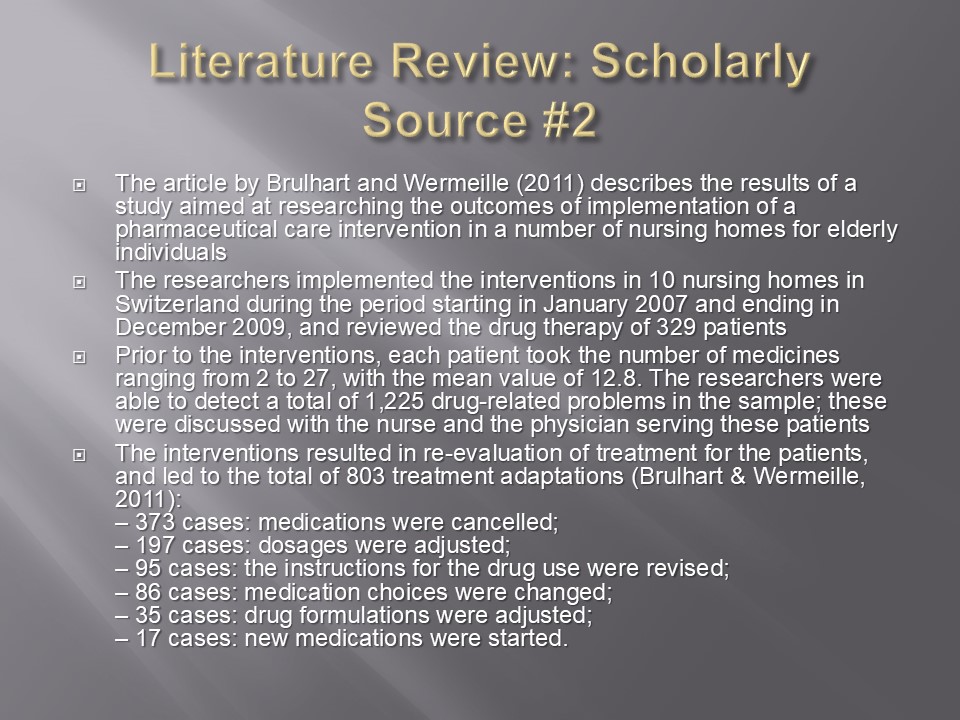
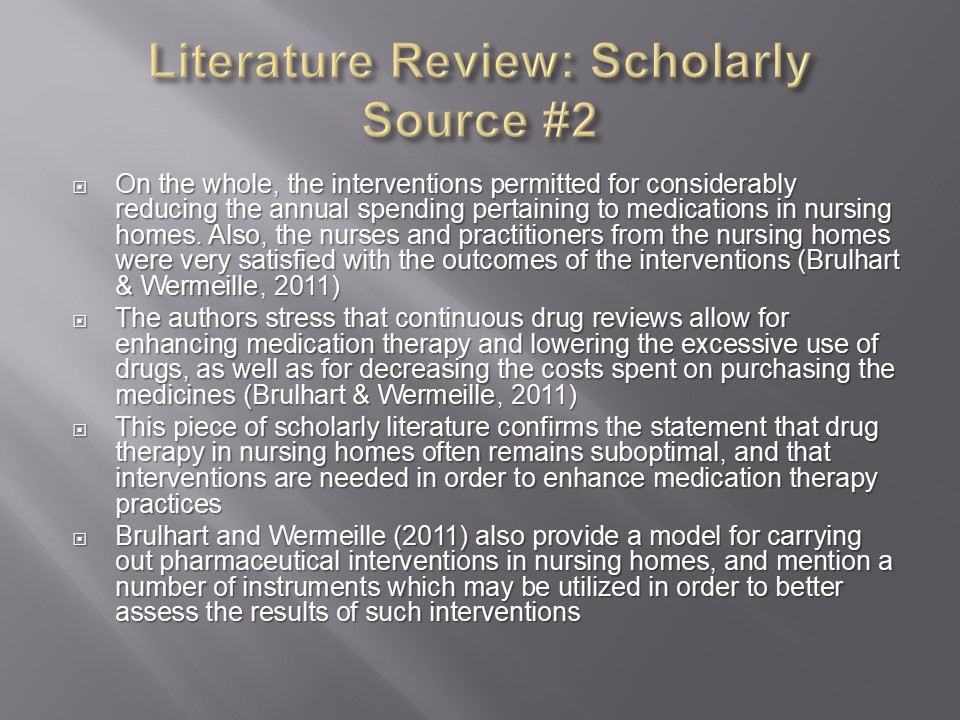
Literature Review: Scholarly Source #3
The study by García-Gollarte, Baleriola-Júlvez, Ferrero-López, Cuenllas-Díaz, and Cruz-Jentoft (2014) pertains to the topic of inappropriate medication prescription to patients of nursing homes for elderly individuals; the research was aimed at estimating the impact of an educational intervention aimed at nursing home doctors with the purpose of addressing the problem of improper medicine prescription and enhancing the patient outcomes and the use of resources.
The researchers provided interventions in 37 Spanish nursing homes; 60 doctors providing medical care for nearly 3,900 nursing home patients were randomly assigned to the intervention (N=30) or control (N=30) groups.
The participants were supplied with an educational program lasting for 10 hours on the whole, and with the support by phone that they could receive on demand.
The results of the intervention were measured using the residents of the nursing homes; a total number of 716 residents completed the study. Out of these 716 patients, 344 received care by the doctors from the intervention group, and 372 received care from the physicians assigned to the control groups.
At the end of the intervention, the results were as follows (García-Gollarte et al., 2014):
- the number of inappropriate medications given to patients was lower in the intervention group than in the control group (M=0.81, SD=1.13 versus M=1.29, SD=1.56, p<.0005);
- the percentage of patients taking 6 or more drugs was lower in the intervention group than in the control group (67.0% versus 76.5%);
- the percentage of patients taking antipsychotics was lower in the intervention group than in the control group (3.2% versus 9.1%);
- the percentage of patients taking duplicate drugs was lower in the intervention group than in the control group (9.2% versus 32.5%)
In addition, the patients from the intervention group had fewer fallers; fewer patients with delirium; fewer visits to a doctor, a nurse, or an emergency room; and spent fewer days in hospitals than the patients in the control group.
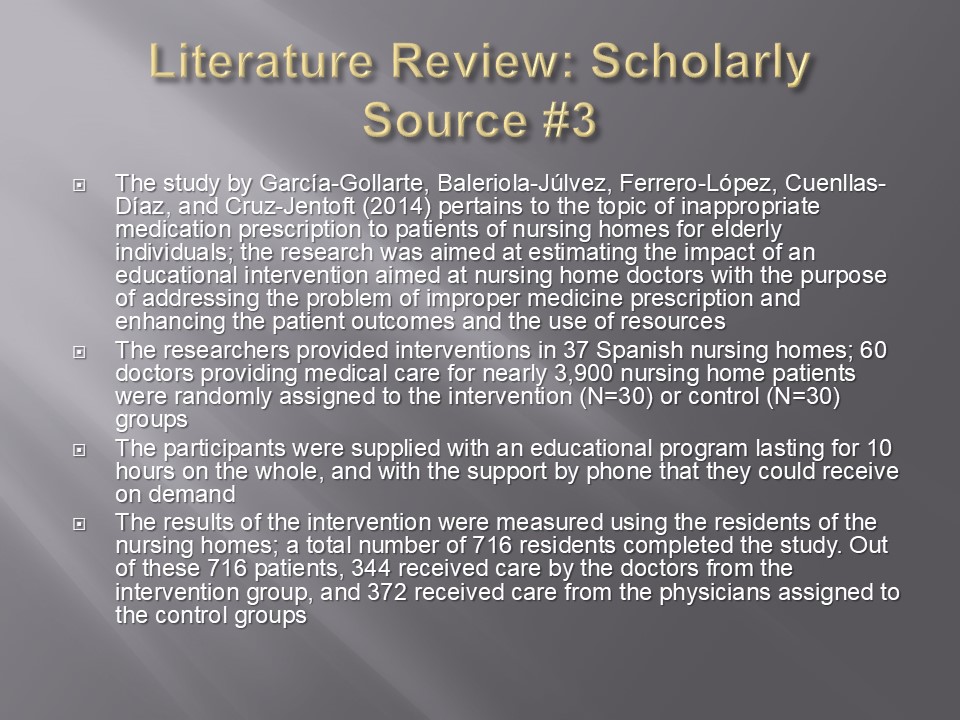
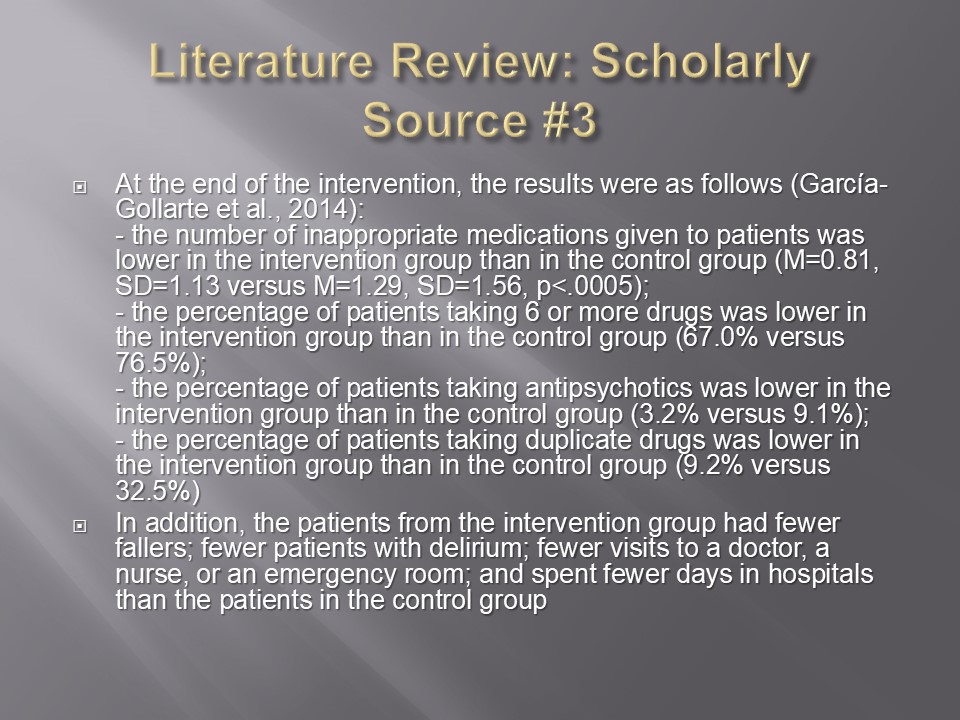
References
Alldred, D. P., Kennedy, M. C., Hughes, C., Chen, T. F., & Miller, P. (2016). Interventions to optimise prescribing for older people in care homes. The Cochrane Database of Systematic Reviews, 1-20. Web.
Brulhart, M. I., & Wermeille, J. P. (2011). Multidisciplinary medication review: Evaluation of a pharmaceutical care model for nursing homes. International Journal of Clinical Pharmacy, 33(3), 549-557. Web.
García-Gollarte, F., Baleriola-Júlvez, J., Ferrero-López, I., Cuenllas-Díaz, Á., & Cruz-Jentoft, A. J. (2014). An educational intervention on drug use in nursing homes improves health outcomes resource utilization and reduces inappropriate drug prescription. Journal of the American Medical Directors Association, 15(12), 885-891. Web.